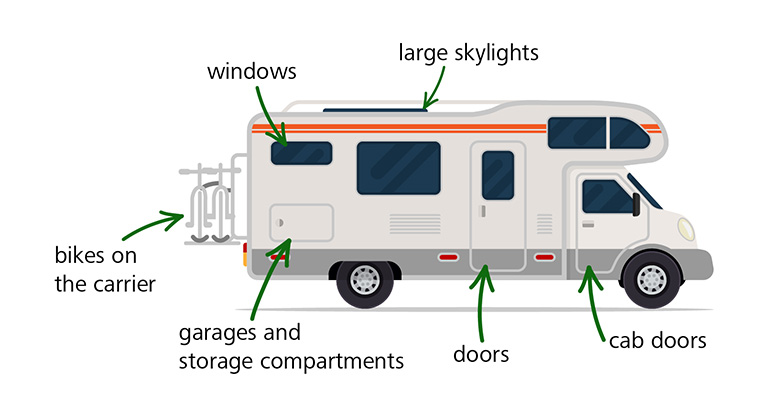Safety while travelling is a hotly debated topic among campers. However, with precautions and the right equipment, nothing stands in the way of a safe trip.
Your motorhome's weak spots
Motorhomes and caravans are a goldmine for thieves. Due to plastic windows and lightweight doors and garage doors, for example, professional burglars can usually break in rather quickly.
You cannot make your recreational vehicle 100 % burglar-proof. However, with some clever systems, the time it takes to break in can be prolonged significantly, so that the burglar might even give up and look for another target.


1. At the top of the burglary statistics are, of course, the cab doors. Most motorhomes are built on standard chassis, which means that burglars can get information about your vehicle beforehand and thus gain access more quickly. Therefore, you should additionally secure your cab doors with mechanical surface-mounted locks or by integrating the door contacts into an alarm system.
2. Another weak spot are radio keys. The easily recorded signals can be intercepted with simple technology and the cab can be opened without a trace. The so-called "replay attack" can be effectively prevented with additional electronic protection.
3. Windows in the superstructure are also at high risk of being broken into. Burglars quickly and easily lever open the locking mechanism of the plastic panes. To prevent this, you can use wireless magnetic contact switches that communicate with an alarm system.
5. The superstructure door is also a weak spot. Although the frame and the door are reinforced, the door can still be prised open in seconds. Here, you can install additional surface-mounted locks to deter burglars.
6. Rear garages often offer easy access to the interior. Burglars can quickly break open the locks on the doors and thus gain access to the interior. It is therefore worthwhile to get additional security for your rear garage. Break-ins into smaller storage compartments are rather rare, as the contents are usually uninteresting.
Protect your windows against burglars
Reinforce your windows with safety profiles so that they can no longer be prised open or torn open so easily. In our shop, you will find a wide range of different security systems for your caravan or motorhome window.
Better security with the right alarm system
Motion detectors and wireless magnetic adapters – pros and cons
Motion detectors


Pros
- Quickly detect intruders when you are not there
- Secure the entire interior
- Inexpensive to purchase


Cons
- Must be deactivated when you are present
- High susceptibility to false alarms
- Restricted freedom of movement inside the vehicle when the motion detector is activated
- No protection of storage compartment doors or the rear garage
Wireless magnetic contacts


Pros
- Any number of contacts can be retrofitted without any problems
- Easy to install without drilling
- Wireless radio connection
- All contacts can be "controlled" individually
- Easy to use
- Warning when windows are open when driving off


Cons
- Each opening must be secured with a wireless magnetic contact
- Expensive to purchase as there are several components
Types of gas
Propane/butane
Also known as liquid gas or camping gas, it is used in almost every caravan/motorhome for cooking or heating. A gas test, which is required by law, guarantees a high level of safety in the vehicle, but cannot rule out a defect in the gas installation. You should therefore fit a gas detector to your gas cylinder, since it warns you of possible gas leaks.
Narcotic gas
Narcotic gas is used by criminals to put campers to sleep. They feed the liquefied gas into the interior through open windows, door rubbers or holes in the window. Sleeping campers are thus easily but effectively drugged so that burglars can gain access relatively unnoticed. Here, too, there are suitable sensors that warn the occupants in good time.
Carbon monoxide (CO)
Carbon monoxide is a gas that is both odourless and tasteless. It is produced by incomplete combustion, for example by a defective boiler or auxiliary heating. If inhaled, it quickly leads to severe symptoms of poisoning and, in extreme cases, to death. Since CO is minimally lighter than air, it rises. Therefore, the different gas detectors should not be installed in the same place.













